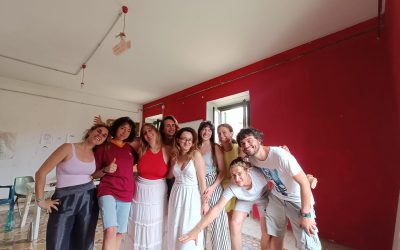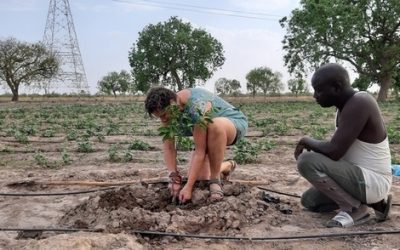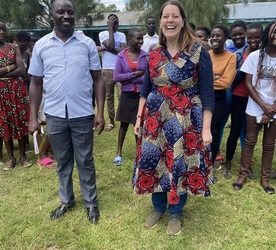Peace
Noella's experience at 'Utopias against War'
The project took place in:
Italy
Training
Written by Noella from France
No War Anywhere : meet Noella about the first encounter of the project in Rome : “Utopias against War”
From April 16th to April 22th of 2023, the seminar “Utopias against War”, part of the project “No War Anywhere!” founded by the European Youth Foundation took place in Rome with the help of SCI Italy. During one week, participants have reflected on antimilitarism and its implications while planning future antimilitarist campaigns for the second encounter of the project in Vienna. Noella, a volunteer of SCI, agreed to share her experience with us.
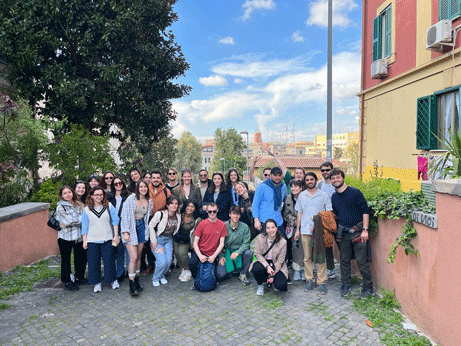
My name is Noella Griselle, I am 22 and I am doing my long term volunteering in Antwerpen, Belgium, with Service civil international as a project and office supporter. I studied international political sciences because I want to work in conflict solving. I decided to do a gap-year to get new knowledge and network on an international level and to have a better understanding on how international ngos works from the inside.
Why did you decide to participate in the antimilitarist seminar No war Anywhere ?
First of all, I want to underline that in my volunteering I have a lot of opportunities aside from my daily tasks to participate in projects for causes and subjects that I am interested in, especially having access to the international web. “Utopias against War” was one of them. I was particularly interested in the seminar because it could help me gain experience as I want to continue my studies in international conflict solving. Antimilitarism is a very important thematic because it enlightens us about the growing militarization, Europe selling weapons to the Global South and a lot of other mechanisms going on. What attracted me about this particular training was its pragmatic and concrete dimensions. Indeed, I want to make concrete actions related to my beliefs and get new knowledge to organize an antimilitarist campaign.
I had not really had a concrete experience with antimilitarism before but I have always been interested in the difficulty of joining an ideal of peace and a necessity of defending yourself in front of a conflict. How to connect pragmatism and moral values ? This subject is also connected to my personal identity since I have congolese origins and I feel particularly passionate about militarization in Africa and how it’s connected with the Global North. On a geopolitical level, I feel like a lot of actual stakes are connected to militarism, like migrations, climate problems …
How would you describe the seminar and what did you learn ?
This seminar was built on understanding what antimilitarism is, what it includes and how increasing its presence. We were all coming from different countries and we all had different views of what is war and what is a conflict. Because we were all standing from a different point it was sensitive and could have led to conflictual situations. We were divided in different groups to work on sub-thematics of militarism such as colonization, climate, capitalism and reflect on how to connect them to militarism. I really like this kind of intersectional approach and it was the most productive workshop for me. I remember particularly one of the last sessions we did about minorities’ point of view and that it doesn’t justify seeing only your own interest and reading of the world.
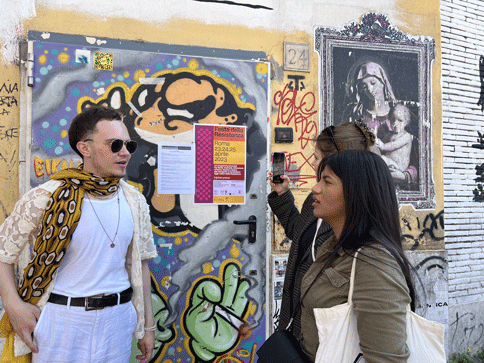
How would you define non violence and antimilitarism ?
Even after this week, it is still a bit unclear for me, as everything needs to be deepened and precised and one week is a very short time. I would say that non-violence is more like a type of action that leads to a way of acting and thinking to fight any form of violence and aggression. I still struggle with finding ways of realizing this kind of action in a violent context. Antimilitarism is more about fighting against any form of militarization from minorities conflicts, daily life to actual wars.
What sessions and/or facts of this week interested you the most ?
The sessions about different thematics of militarism were the one that I liked the most. We had to consult videos and documents and create a campaign from them, showing them to others in a certain manner. My team worked on colonization, it was a really interesting exercise and we decided to build it around the idea of legitimacy of speaking about one subject without including the main persons concerned and how it was problematic. Colonization is a sensitive and specific theme and I feel like we digressed a bit because it took an unexpected turn but it still felt productive. Decolonizing the speech about colonization means that the main story should not be narrated from ex-colonizers or outsiders of colonized countries but people directly victims of it. If not, we are also taking away from them the narration and their stories.
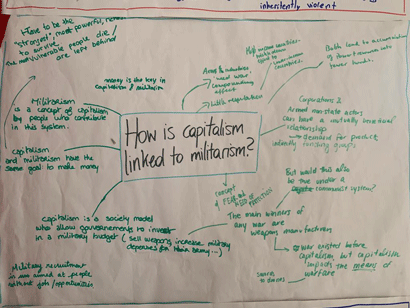
What did this seminar bring that was unexpected ?
People were more or less agreeing most of the time, it was way less conflictual than I thought it would be. Everyone was extremely careful on how they were saying things, maybe not everyone felt 100 % safe to express their thoughts in a blunt way. Antimilitarism can bring a lot of debates and personal life experience.
What do you think everyone should know about antimilitarism or militarism ?
I think everyone should look at the number of countries and European countries where military service is mandatory because I feel that we associate that a lot with authoritarian countries or non democratic countries, but there are still some European democracies that have a military service. There are about 50 countries in the world that have mandatory conscription. It says a lot about the importance of the military nowadays.
Did you decide on an antimilitarist campaign that you want to lead ?
With another participant, we want to organize a campaign about the business of exporting weapons from European countries to African countries. We want to obtain more transparency because it feels like information is not circulating a lot. How come there are such heavy weapons in the hands of some rebellion groups or in isolated areas of the world ? What are the weapon roads ? Where are they from ? How they keep nurturing conflicts. We are still hesitating on the area between focusing on France or Belgium.
Why do you think antimilitarism is important nowadays ?
Violence and militarism are rising. Money keeps being invested in it instead of being reinvested somewhere else. For me, it’s impossible not to inform and act.
Do you have any conclusion ? Any recommendations for people that want to learn more about it ?
As an activist, it is the first time that I am being involved from the beginning to the end in creating a campaign and learning what it involves at all levels. I hope that my experience will grow in this process and that I will continue to be involved and grow on those matters. This week gave me a clearer vision of my future and of my professional life and confirmed my interest in conflict solving.
As an SCI member, I would of course encourage people to read our news and newsletter on SCI international website. I recommend vividly to read social media and websites and keep yourself informed in any way possible, not only of your own countries but also of the regional press that focus on some areas of the world like Middle East Eyes for example. Involving yourself locally and mobilizing yourself by joining organizations that match your values.
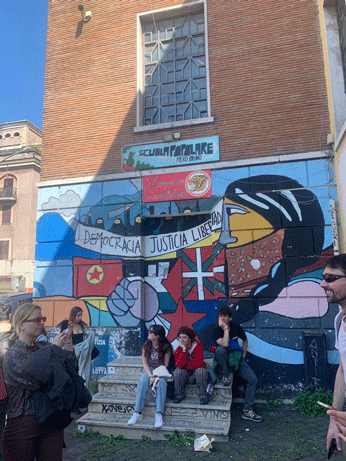
The No War Anywhere! project is co-funded and made possible by the Council of Europe through the European Youth Foundation and the European Commission’s CERV Programme.
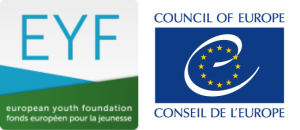

You can still join!
Want to have your own volunteer experience for peace?
Read more Voices of Volunteers

